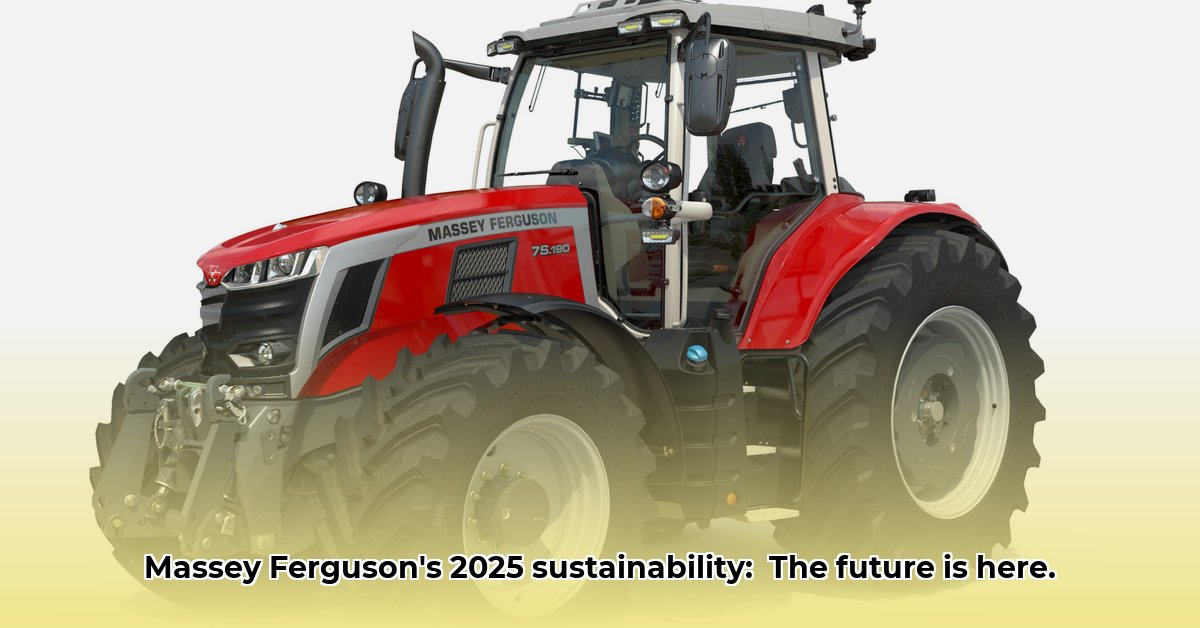
Massey Ferguson Tractors and the Drive Towards Sustainable Agriculture
Farming is undergoing a profound transformation, with sustainability no longer a desirable aspiration but a critical necessity. Farmers are increasingly seeking equipment that minimizes environmental impact while maximizing efficiency. This report delves into the world of Massey Ferguson tractors, examining their contribution to sustainable agriculture. We'll analyze models, focusing on fuel efficiency, emissions, and the overall environmental footprint, providing actionable insights for farmers and stakeholders alike. But first, let's address a critical issue: the need for greater transparency from Massey Ferguson regarding its sustainability data. For more detailed specifications, visit the Massey Ferguson tractor models page.
The agricultural landscape is changing rapidly. Farmers are under immense pressure to adopt sustainable practices, and choosing the right equipment is a key factor in success. How do Massey Ferguson's latest models, including their updated triple mowers and small square balers, contribute to this shift? The manufacturer claims improved efficiency, promising more output with fewer resources. This is certainly a positive step, and their award at the California Rodeo Salinas for environmental stewardship indicates some commitment. Yet, a deeper dive reveals a significant knowledge gap.
A comprehensive understanding of a tractor's environmental impact necessitates a lifecycle assessment (LCA) – a thorough analysis encompassing every stage of its existence, from raw material extraction to end-of-life disposal. This holistic view reveals the full energy consumption, material use, and waste generation associated with the product. Unfortunately, detailed LCAs for most Massey Ferguson tractor models are lacking. This lack of data significantly hinders independent evaluation of their sustainability claims. Isn’t this concerning, considering the magnitude of their contribution to global agriculture? This lack of transparency poses a considerable risk to Massey Ferguson’s reputation.
Choosing a tractor involves more than horsepower and features. Consider the fuel consumption rate – less fuel equals lower emissions and operating costs. Does the model comply with the latest emission standards (such as Tier 4 Final)? Furthermore, investigate the manufacturer's commitment to responsible manufacturing processes, including the use of recycled materials and energy-efficient production techniques. Adopting sustainable farming practices, like precision agriculture with GPS-guided planting, can significantly reduce environmental impact.
How to Evaluate Massey Ferguson's Environmental Impact
Key Takeaways:
- Optimizing fuel efficiency is crucial; lower fuel consumption directly translates to lower emissions and operating costs.
- Advanced technologies, such as precision farming, dramatically improve efficiency and resource utilization, reducing overall environmental impact.
- While electric tractors offer clear emission benefits, technological hurdles regarding battery technology, infrastructure, and cost remain.
- Harnessing alternative fuels, such as biodiesel and biomethane, presents a pathway towards sustainability, but their current availability and cost remain challenges.
- A comprehensive lifecycle assessment is essential for a complete picture of a tractor’s environmental footprint, yet this data is often unavailable for Massey Ferguson models.
A Multifaceted Approach to Evaluating Sustainability
Evaluating the environmental performance of Massey Ferguson tractors requires a multi-faceted approach. Consider these key factors:
Fuel Efficiency: Examine fuel consumption data for various models. Consider not only the fuel economy but also the relationship between engine size and output. A larger engine may consume more fuel but may also complete tasks more rapidly.
Emission Standards: Determine if the tractor meets current emission regulations. Newer models generally adhere to stricter standards.
Alternative Fuels: Assess whether the tractor can utilize alternative fuels like biodiesel. This can significantly reduce emissions, but fuel availability and costs should be considered.
Manufacturing Practices: Investigate the manufacturer's commitment to environmentally friendly manufacturing techniques. This includes the use of recycled materials and energy-efficient production processes.
Lifecycle Assessment (LCA): While often unavailable for specific Massey Ferguson models, recognizing the need for complete LCA analysis from production to disposal is crucial for responsible purchasing decisions.
The Urgency of Transparency and Action
The lack of readily accessible, comprehensive data represents a significant obstacle to properly evaluating Massey Ferguson’s environmental impact. Greater transparency from manufacturers is essential. Standardized, comparable data on fuel consumption, emissions, and lifecycle impacts are needed to inform purchasing decisions and drive widespread adoption of sustainable agricultural practices. The future of farming, and our planet, depends on it.
Risks and Opportunities for Massey Ferguson
Massey Ferguson faces both substantial risks and exciting opportunities in the evolving landscape of sustainable agriculture. Their response to these challenges will significantly impact their future success. Further research is needed to completely understand the sustainability efforts across their diverse tractor models. Ongoing studies will be crucial in providing a more comprehensive evaluation of their environmental performance.